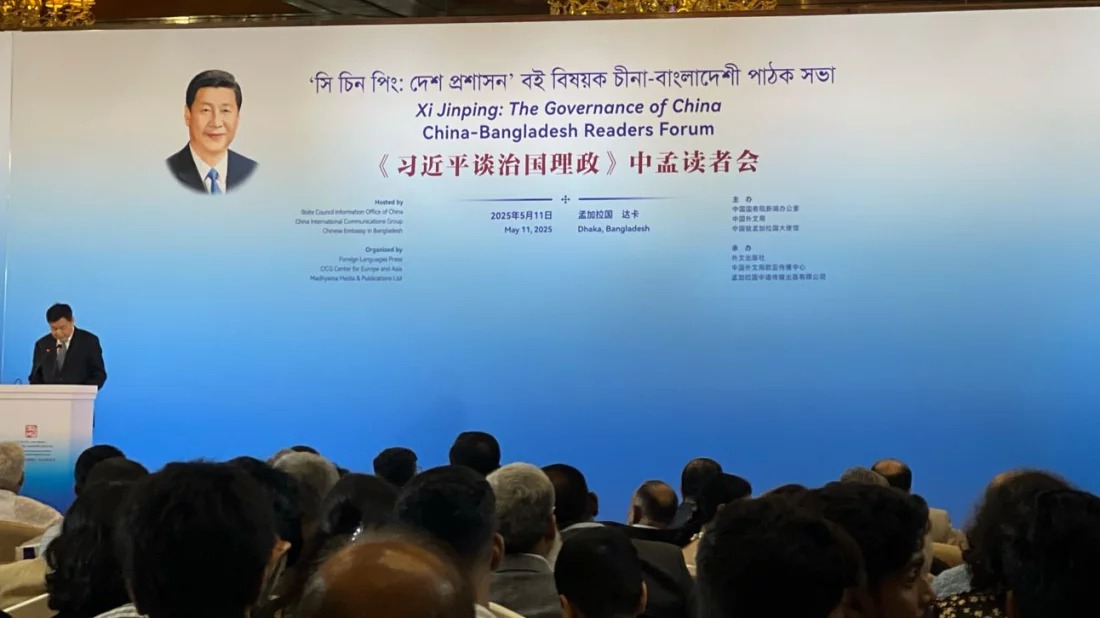Chinese Ambassador to Bangladesh Yao Wen has expressed his hope that Chinese modernization can offer some reference for Bangladesh and fellow Global South nations as Bangladesh stands at this “crucial crossroads of transformations.”
He was speaking at the “China-Bangladesh Readers Forum on Xi Jinping: The Governance of China” at a hotel in Dhaka on Sunday afternoon.
“Modernization is a common task for the Global South. In a matter of decades, China has accomplished what took Western nations centuries,” he said, adding that it achieved two miracles—rapid economic growth and sustained social stability, debunking the myth that modernization means Westernization.
Yao said China’s practice offers fresh perspectives and inspires developing nations to pursue their own modernization pathways.
Power, Energy and Mineral Resources Adviser Muhammad Fouzul Kabir Khan, who recently accompanied Chief Adviser Prof Muhammad Yunus during his visit to China, spoke as the chief guest.
He highlighted the growing relationship between the two countries in key areas.
BNP Standing Committee Member Dr Abdul Moyeen Khan, Chief Adviser’s Press Secretary Shafiqul Alam, China International Communications Group (CICG) President Du Zhanyuan and Jamaat-e-Islami Nayeb-e-Ameer Dr Syed Abdullah Mohammad Taher also spoke at the event.
Through the joint efforts of both countries, the envoy said they have proudly organized this forum about the Bengali edition of Xi Jinping: The Governance of China (volume one).
As one of the most important initiatives of the Bangladesh-China year of people-to-people exchanges, Ambassador Yao said this event marks an important part of experience sharing on state governance.
“Xi Jinping: The Governance of China” contains important works by Chinese President Xi Jinping from 2012 to 2022.
To date, it has been published in four volumes with 42 language versions, reaching over 180 countries.
“You can find it on the bookshelves of nearly 1,700 major libraries worldwide. It is the preferred go-to book for countries to observe and study China,” said the ambassador.
Since its publication, he said, this work has gained global recognition as the most influential leadership publication, featuring unprecedented multilingual reach and worldwide distribution.
“Government leaders and policymakers across continents have actively studied and added it to their collections,” said Ambassador Yao.
“I often read and study them, especially the parts of vital significance. They articulate the Chinese leader’s vision and strategies for the new era, and present the profound yet accessible governance philosophy with timeless wisdom that remains relevant today,” he said.
He added: “If one seeks to understand China’s success, the answers lie within these pages.”
“This work opens a window for Bangladeshi readers to understand contemporary China,” said the ambassador.
“Lots of Bangladeshi friends used to ask me how China could lift nearly 100 million people out of poverty. And I told them that you may find the answers in this book,” he said.
China’s remarkable socioeconomic transformation would not have been possible without the great theoretical guidance, he mentioned.
Through this important work, the ambassador hoped their Bangladeshi friends would gain deeper insights into China’s development path, governance philosophy, and guiding principles.
“This work provides a useful reference for Bangladesh on its way to modernization,” he said.
“This work is a new platform for us to engage and learn from each other. China’s neighbourhood diplomacy is built upon the principles of amity, sincerity, mutual benefit and inclusiveness,” said Ambassador Yao.
“Chief Adviser Professor Yunus visited China in March and reached a consensus on many issues with President Xi,” he said.
“The two sides reaffirmed to further deepen political trust and exchange experiences on state governance,” he added.
“In this book, President Xi Jinping elaborated the idea of building a community with a shared future for mankind, as well as China’s path to modernization.”
“These ideas and Professor Yunus’s vision for a World of Three Zeros are closely aligned and mutually reinforced,” said the ambassador.
With the publication of this work, the ambassador said they are writing a new chapter for exchanges on state governance and people-to-people ties.
“We look forward to working with Bangladeshi counterparts to facilitate the release of subsequent volumes in the near future,” he said.
The CICG president hoped that the two countries would work together for common development and prosperity, and the people of both countries would enjoy long-lasting peace, happiness, health and well-being.







